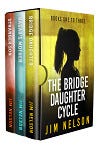What do readers really want?
Written Word Media (the Freebooksy people) answers the question “What Do Readers Really Want?” after running a survey of their own readers. There’s a lot in the blog post to absorb. Here are the key points I took away:
“60% of respondents saying that they have no preference between series or standalone books. 14% said they prefer series while 26% said they prefer standalone books.”
(Translation: Both styles have their fans, but I suspect writers will still find more success building a series and following through.)
“We asked readers what makes them stop reading a book… The most common theme among responses was the word BORING.” (Ouch.)
“Only a third of readers actively want to interact with authors… The top choices were email (75%) and social media (52%).” Interesting news for those trying to build a newsletter following.
Readers’ preferred social media platform: Facebook. By a landslide. It’s not even close.
Another no-brainer: Readers like free books. I could write 3,000 words on how the free e-book glut is eating authors alive, but that will have to wait for another day.
Slightly more surprising: “Only slightly less popular [than a free book] was the $0.99 book with two 5 star reviews.“ Readers appear willing to give a low-reviewed book a chance—if the price is right.
Worth a skim.
B. R. Myer’s A Reader’s Manifesto twenty years later
Over on my author web site, I recount the history of B. R. Myer’s A Reader’s Manifesto and the impassioned controversy its 2001 publication roused. If you don’t remember, or you’re simply (gulp) too young:
Twenty years ago this month, The Atlantic published a critical essay on the then-current state of American prose. As dry and dusty a topic that sounds—doubly so when published by an august New England monthly—it improbably became a cultural sensation, leading to op-eds in international newspapers, vitriolic letters-to-the-editor, screechy denunciations from professional reviewers across the media spectrum, and readers everywhere debating—of all things—the modern novel.
The original essay was expanded into a book that has greatly influenced me, both as an avid reader and a novelist. I look back at A Reader’s Manifesto and how it changed the book publishing landscape—even though people today still deny it. Full post here.
On writing contests
Dorian Hart offers a thoughtful Twitter thread:
Much of what he discusses—especially the mercurial nature of book contests and their judges—applies equally to book agents, publishers, and magazine editors.
A pernicious myth about the publishing world is that it’s a meritocracy—that good fiction gets published, great fiction becomes bestsellers, and bad fiction is rejected. It’s simply not true. There’s so much subjectivity, taste, and flat-out prejudices in this field. Believe in yourself, and believe in your hard work. Find your readers.
Kindle Vella update
Amazon has been sending out “last call for getting in on Kindle Vella” emails, so it’s obvious the launch time is approaching. One major question writers had about the upcoming serialized fiction platform regarded republishing their own material. Amazon revised their content guidelines in response to comments and complaints.
If you’re jumping into Kindle Vella, I strongly recommend going over the full guidelines. Don’t assume Vella is merely Kindle Direct Publishing with each chapter released one at a time. They’re very different beasts.
Noises Off
Looking to craft custom background noise to isolate the next time you’re writing? I knew you were. Strap on your noise-cancelling headphones and visit noises.online. Mix-and-match the sounds of a cafe, frogs, rainfall, campfires, and more. You can save the setup to play later through your browser or download a .WAV file to play on loop.
Very cool to fiddle around with, but don’t spend too much time on it—get back to writing!




